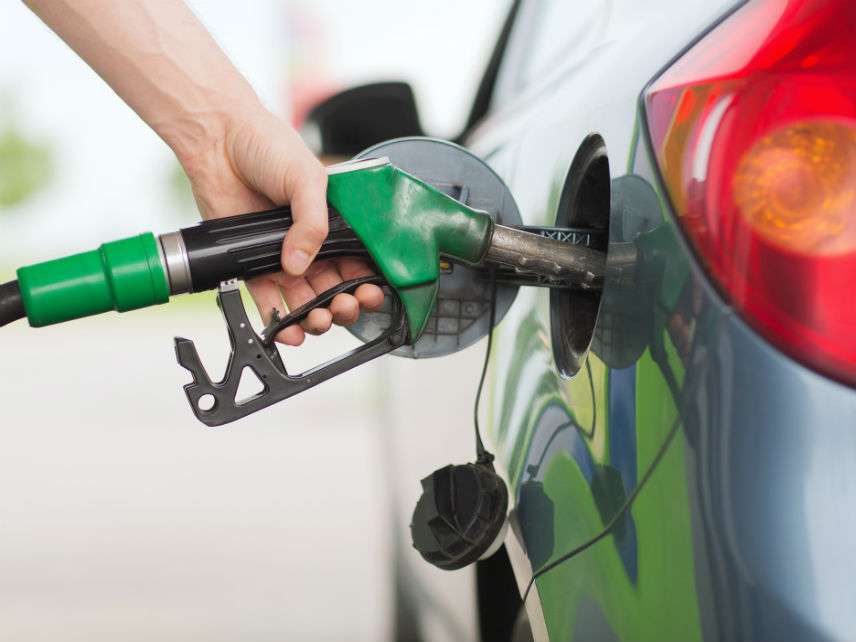California Sues EPA to Maintain Automobile CAFE Standards That Hurt the Poor
How cowardly politicians avoid telling voters that they should pay more for the privilege of driving

The Environmental Protection Agency last month launched a new rule-making process that aims at rolling back Obama-Era Corporate Average Fuel Economy (CAFE) standards. In addition, the EPA is looking to revoke the long-standing regulatory waiver that allows California to set its own automobile fuel efficiency and emissions standards.
When the auto industry was on the ropes during the financial crisis ten years ago, the Obama administration in exchange for bailout funds extracted a promise from the car companies that they would achieve a fleet-wide fuel efficiency of 54.5 miles per gallon on new cars by 2025. "At every step in the process the analysis has shown that the greenhouse gas emissions standards for cars and light trucks remain affordable and effective through 2025, and will save American drivers billions of dollars at the pump while protecting our health and the environment," said outgoing EPA head Gina McCarthy in 2016.
That was then. Shortly after Trump administration minions had taken over various federal regulatory agencies, carmakers sought some loosening of the Obama CAFE standards. Environmentalists and Democratic politicians vowed to fight to maintain the stricter CAFE standards. Yesterday, California and 17 other states filed a lawsuit in the United States Court of Appeals for the District of Columbia Circuit arguing that by opening up a new fuel economy rule-making that the agency has "acted arbitrarily and capriciously, failed to follow its own regulations and violated the Clean Air Act."
Lowering harmful air pollutants is a worthy goal, but mandating CAFE standards is a dumb and inefficient way to help clear the air. California Attorney General Xavier Becerra is just just wrong when he asserts that CAFE standards are "a boon for hardworking American families." As I have earlier reported whatever else CAFE standards may do, they especially hurt the poor:
In a new study contrasting the effects on consumers of energy efficiency standards versus energy taxes, the Georgetown economist Arik Levinson notes that both energy efficiency standards and energy taxes function as a regressive tax, taking a larger percentage of a lower income and a smaller percentage of a higher income. His analysis aims to find out which is more regressive—in other words, which is worse for poor Americans.
Levinson cites earlier research that estimates a gasoline tax would cost 71 percent less than the comparable CAFE policy per gallon of fuel saved. Meanwhile, a 2013 study calculates that CAFE standards cost more than six times as much as a corresponding gas tax for the same reduction in fuel consumption. In other words, if policy makers want people to use less fuel and drive more fuel-efficient cars, taxing gasoline is a much cheaper way to achieve that goal than mandating automobile fuel efficiency. Levinson concludes that "efficiency standards are, ironically, inefficient."
I have long been a critic of CAFE standards. Back in 2009, for example, I concluded that Obama's proposed CAFE standards operate as an inefficient stealth tax on driving. It's inefficient because drivers pay more, car companies make less money, and state and federal governments don't get any extra revenues. If activists and politicians want Americans to drive more fuel-efficient cars, the simple and honest thing to do would be to substantially raise gasoline taxes concluded a 2002 National Academy of Sciences report. Ultimately, I argued, setting CAFE standards is just a way for cowardly politicians to avoid telling their fellow citizens that they should pay more for the privilege of driving. If that's what our political leaders think, then they should just be honest and come out in favor of higher fuel taxes.
Interestingly, President Trump endorsed in February the idea of a 25 cents per gallon gasoline tax to fund repairing America's highways. Higher gas taxes would also have the side effect of incentivizing people to buy more fuel-efficient cars and drive less. In this case, President Trump's gas tax is a bit more straightforward than the Democratic politicians' defense of Obama-era CAFE standards.


Show Comments (52)